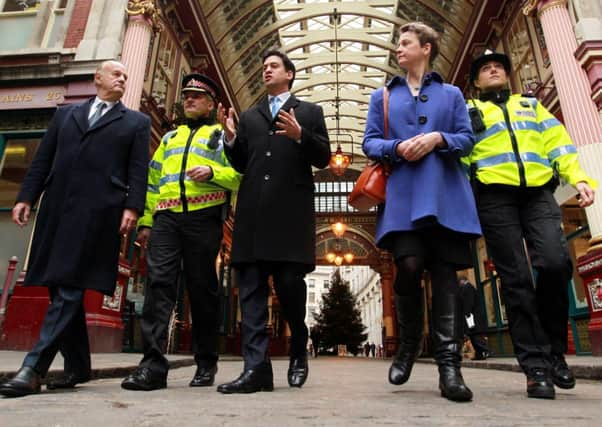Rogue cops could face being ‘struck off’


The Independent Police Commission, chaired by former Metropolitan Police commissioner Lord Stevens, will make a series of sweeping recommendations including a focus on neighbourhood policing and officers walking the beat.
But in recognition of policing scandals including Hillsborough and the Plebgate row involving former chief whip Andrew Mitchell, Lord Stevens recommends a fundamental shake-up of professional standards in forces in England and Wales.
Advertisement
Hide AdAdvertisement
Hide AdThe Independent Police Complaints Commission (IPCC) and Her Majesty’s Inspectorate of Constabulary (HMIC) would be scrapped and replaced by a new Independent Police Standards Commission (IPSC).
Lord Stevens’ report, published today, recommends a new status of chartered police officer, in addition to the office of constable.
The reform would bring the police into line with other professions such as nursing, with officers registered with the College of Policing which could strike them off for failing to meet professional standards.
The College of Policing would decide misconduct hearings in public, unlike the current, opaque, disciplinary process.
Advertisement
Hide AdAdvertisement
Hide AdThe report said: “The commission recommends creating a ‘chartered police officer’ as the basis of the police profession.
“A ‘chartered’ police officer accountable to a strong professional body will improve public confidence and give greater competence and status to police officers and staff.”
It added: “The presumption should be for total transparency - with open, public hearings for decisions on serious misconduct - rather than the muddled regime of partially open hearings and judgments which currently prevails.
“Police officers found to have committed serious misconduct by the College of Policing board should be struck off from the register.”
Advertisement
Hide AdAdvertisement
Hide AdThe IPSC would be responsible for enforcing the standards set by the College of Policing under the commission’s proposals.
The Labour-commissioned report said: “A spate of organisational failures and scandals over recent years has badly damaged public confidence in the integrity of the police. It is vital this situation is put right. Recent experience has found wanting the existing system which separates the monitoring of organisational performance from the investigation of police complaints.
“The commission suggests a single significant reform to remedy the failings of current arrangements.”
It added: “The College of Policing would have responsibility for managing new ‘professional competence and conduct panels’, but the IPSC should have the duty to ensure that they are meeting the public interest.
Advertisement
Hide AdAdvertisement
Hide Ad“We envisage that the new body would be ‘prosecution authority’ for serious complaints and the appeal body for complainants who were not satisfied with lower level complaints.”
Lord Stevens, who introduced neighbourhood policing at the Met, said his commission heard that officers were in danger of “beating a retreat from the beat” to a “discredited” reactive form of policing.
At the report’s launch Labour leader Ed Miliband will say: “This review is the first step in setting a new direction for policing in the 21st century.
“Neighbourhood policing was pioneered by Labour. It wasn’t just a slogan, it was a different philosophy of policing: policing rooted in local communities, doing more than reacting to crimes by also preventing them, and working in partnership with local authorities, schools and the NHS.
Advertisement
Hide AdAdvertisement
Hide Ad“So it is of profound concern to me that the independent commission concludes that neighbourhood policing is under threat. We don’t want to see services retreating back to their silos, becoming more remote from communities.”
Writing in the Sunday Telegraph Lord Stevens said: “Our commission has looked at how we can change policing to keep a community-based approach, stopping what we see as the risk of beating a retreat from the beat.”
He added: “Neighbourhood policing is the golden thread that runs through it all, and is foremost in my mind to secure a service fit for the 21st century.”
Lord Stevens acknowledged that no extra money for his reforms would be made available, but said he had identified £60 million of savings to 2016/17 by paying the lowest price for common equipment - a sum Labour will claim could pay for 500 extra officers.
Advertisement
Hide AdAdvertisement
Hide AdLabour will consult on the report’s recommendations over the next 12 months before setting out its plans for the 2015 election manifesto.
Lord Stevens also spoke about the need for forces to work with the media.
It comes almost exactly a year after the Leveson Inquiry into press standards recommended that all top-ranking police officers - from Assistant Chief Constable upwards - be forced to publish dates and subject matter of meetings with media.
Asked about the need for public trust in the police, Lord Stevens told BBC Breakfast: “We think there should be a re-engagement with the media, for a start-off, and then we think there should be a different way with dealing with complaints.
Advertisement
Hide AdAdvertisement
Hide Ad“We think there should probably be an amalgamation with the IPCC - the complaints body - and (Her Majesty’s Inspectorate of Constabulary).”
Lord Stevens also spoke of the need to “professionalise” the industry.
He said: “It’s all about raising professionalism in the police.
“But I don’t think there should be a right to strike for the police service.
Advertisement
Hide AdAdvertisement
Hide Ad“It is a public service, which is essential. It is the agency of first and last resort.
“We cannot do without the police service so there should not be a right to strike.”
He said economic experts described the recommendations as “cost-neutral”.